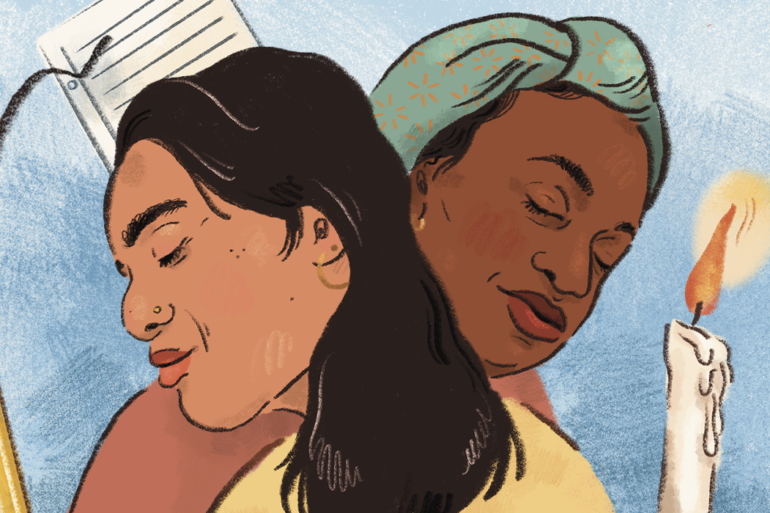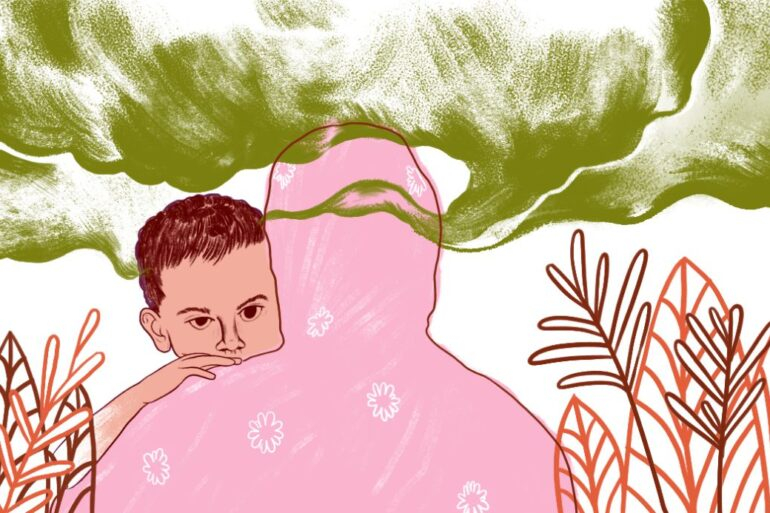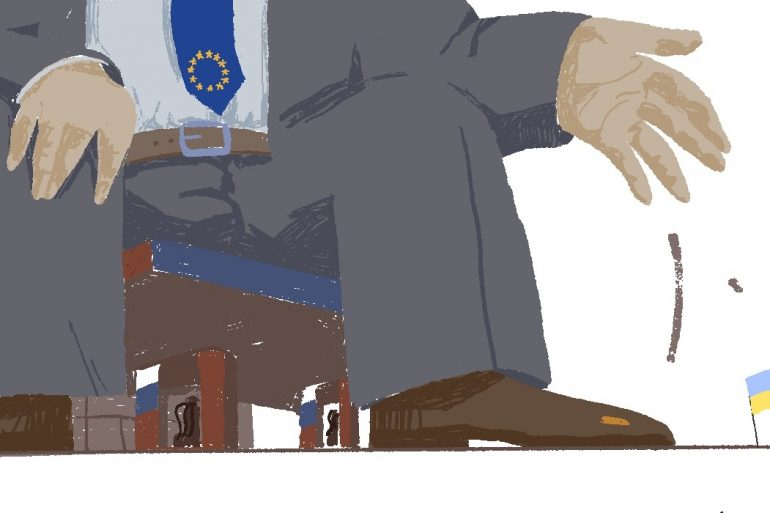It’s legitimately hard to keep up with UK politics at the moment. At the time of writing (which won’t have much longevity given the fact that we’ve had three Secretaries of State for Education in as many days), 52 Conservative MPs have resigned and even Prime Minister Boris Johnson has been forced, kicking and screaming, to step down in Autumn. And while sitting back and enjoying the chaos is appealing, it’s important to note that the rot goes much deeper than a revolving door of Tories can fix.
The Conservatives have had the UK in a chokehold since 2010, and this year marks ten years since then-Home Secretary Theresa May announced plans to create a “hostile environment” for migrants and refugees – and with the inhumane Nationality and Borders Bill seeking to further marginalise, criminalise and deny justice to people seeking asylum in the UK, I wanted to hear from someone at the frontline of practical support. So last month, I spoke to Maria Patsalos, an immigration lawyer at Mishcon de Reya, about the UK’s culture of disbelief, the common misconceptions around those who seek asylum and the barriers faced by women in the system. Off the back of Mishcon’s support of shado’s first documentary with Comfort Angels, the women’s football team made by and for refugees, we also talked about the power of football for people seeking asylum.
First things first, why do you do what you do?
I love immigration, because you basically get to help people. It’s a fantastic area of law because it’s constantly evolving, constantly changing; it’s highly politicised, which I’m sure we’re going to get to later – but fundamentally it’s the most important thing in most people’s lives: where they’re going to live, are they going to be with their loved ones? And we get to help facilitate that. So it really is a feel-good job for most of the time.
Can we talk a bit about specific barriers that women in the asylum system face?
This is an interesting question, because there are actually no specific barriers in law – all people seeking asylum are treated the same in relation to their cases – but as with most things, there are inherent issues. For example, women often get left behind with children; the men will go first and claim asylum and then try and bring families later, but that often doesn’t work out. Or for example, women are more likely to be trafficked, and there’s a culture of disbelief when it comes to trafficking, and people seeking asylum. They get criminalised instead of being offered help.
To dig a bit more into this ‘culture of disbelief’, which is very pervasive – what are some of the biggest misconceptions that people have around the asylum seeking process, which then feed into a larger hostility towards migration?
Having been an immigration lawyer now for a long time, whenever I announce my job to anyone, I get a certain reaction. It’s rooted in these common myths around numbers – people are under the misapprehension and misunderstanding that the UK has this huge number of refugees, and that they’re here to get British jobs and homes, but the reality is that we have a very small proportion of the world’s asylum seekers – tiny, in fact, compared to other countries.
Can you tell me a bit more about how the changing political environment in the UK, bolstered by the proposals in the Nationality and Borders Bill, has impacted the people seeking asylum that you’re working with?
Well, even before it becomes law and physically impacts them, there are ripple effects caused by the rhetoric itself, which is incredibly hostile and unwelcoming. Some of the biggest concerns in the Bill is the criminalising of people who are coming here to claim asylum, which I think is a big mistake. The other one is the ‘offshoring’ of the asylum processing system to countries such as Rwanda. This is quite frankly inhumane. There’s a reason why other countries do not do things like this, and we should certainly not be one of the first. I know that Australia does it, but that’s about it, and it’s not a model that I think we should be following. I understand that the Government thinks that it’s going to be a ‘deterrent’, but it’s really quite wrong.
I think one of the biggest myths is this idea that stricter border controls is going to dissuade people from seeking asylum and migrating to the UK, but in actual fact it’s just going to make the journey more treacherous, and it’s just going to lead to more deaths.
Absolutely. Like I said before, we don’t receive the most amount of people seeking asylum simply because we are an island and it is difficult for people to get here already – we don’t need to have these huge deterrents, because it is already difficult.
You’re the Immigration representative in Mishcon’s Sports Group. I know football has had a big impact on your life, and I’d love to know a little bit more.
I love football. I’m a big Gooner (Arsenal fan), I’ve got a season ticket, I’ve had it for seven or eight years now and I go regularly with my brother. It’s a great bonding experience between me and my brother. I’ve loved football since I was a kid – it really brings joy.
I think sports does that generally – it’s fantastic for teamwork, for community, for hope, for being able to forget your issues and your problems. Work just goes out of the door when you’re watching or playing a football match. You’re fully engrossed and involved; it’s a lovely experience, and I think everyone who loves sport will relate to that.
That’s something that came up time and time again during our time with the women in Comfort Angels; this idea that you can escape for an hour a week and just focus on enjoying the game.
Absolutely. The documentary puts such a smile on my face because it really resonates with my experience and other people’s experience – it’s fantastic to see that the women overcome their hurdles and that they’re playing together and supporting each other in this incredible way.
From Gooners to grassroots, what role do you think grassroots football can play in integration and community building?
A huge role. I really think that. Football transcends everything – religion, language, hostility, bias – all of those things. Put a ball down, everyone has a kickaround – it’s fantastic. So it has a huge impact on that sense of community and togetherness and bringing diverse people together.
However, and even though slow steps are being taken to change this, there is still a bias towards women within the sport. What more do you think can be done for women within the grassroots football space?
A lot more. Even the other week, we were contacted by a women’s football team, who were being kicked off their pitches so the service provider could run a commercial men’s league instead. And this is just a small example of how the men’s game is prioritised over the women’s game, even at grassroots level. And so, we really need to make sure that these pitches, these safe spaces, are preserved for women, because they add so much more value than one can imagine.
And if you could change one thing about the current process for people seeking asylum, what would it be?Well sadly there’s more than one thing. One of the things that I think should be changed is the fact that people seeking asylum are unable to work; the House of Lords have pushed back on this element of the bill, and I agree.
I also think that the processing time itself is really quite unacceptable – it can take years, absolutely years, and our clients and other people seeking asylum are in limbo during that period. Their life is on hold – it’s very unsettling, they can’t integrate into their new community, because they don’t know whether they’re going to be sent off at any given day – it’s really difficult. So the processing time, the ability to work, and I think it was in the film, the small amount of funds that are given to asylum-seekers to live off on a weekly basis is really abysmal.
Yes – Hane, the goalkeeper, speaks about how she has been waiting on her asylum claim for eight years, and speaks of the £39 a week that the state expects people seeking asylum to survive off.
It’s unimaginable. And on top of that, the culture of disbelief that I mentioned, in relation to the application process and the determination of the applications themselves. Most applications are refused at first instance, and the person seeking asylum will then need to appeal the decision, which again adds years; go before a judge, and explain the case there. Most appeals are allowed, which means that the initial decision was wrong! So all of these things together should, and need to be, changed.
And unfortunately not very rare. So from a more grassroots level, how do you think communities can best support those going through the asylum seeking process?
Simply by offering help. Help to integrate, welcoming them – there’s lots of different things that can be done, whether it’s meeting them for coffees, helping them practice their English language, donating food – but more importantly, welcoming them into the local community. We’ve seen a huge response to the Ukraine crisis, and how people have opened up their own homes to help people in danger, and this can be replicated more widely. Why should it only apply to the Ukrainians?
So, while the Cabinet may well continue to forcibly reshuffle, the policies which deliberately Other those who seek asylum on Britain’s shores remain steadfast. Community mobilisation against immigration raids and the grounding of the first offshoring flight to Rwanda show the power of the people in the face of the hostile environment, and it’s important that we continue to fight for the dignity of all those who are targeted by it.
What can you do?
- Join or support an anti-raids group
- Donate to Comfort Angels
- Read The Good Immigrant by Nikesh Shukla
- Check out the JCWI’s toolkit for Resisting the Hostile Environment















